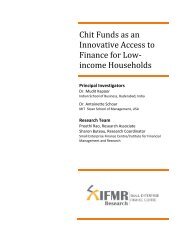Government of India Volume I: Analysis and Recommendations
Government of India Volume I: Analysis and Recommendations
Government of India Volume I: Analysis and Recommendations
Create successful ePaper yourself
Turn your PDF publications into a flip-book with our unique Google optimized e-Paper software.
FUNCTIONS AND POWERS OF THE REGULATOR<br />
Table <strong>of</strong> <strong>Recommendations</strong> 4.7 Giving permission to carry out a business<br />
The system <strong>of</strong> giving permission to new entities must be strictly governed by regulations <strong>and</strong> finished within a time<br />
bound manner. The provisions must:<br />
◮ Provide a system for persons to apply for authorisation to provide financial services;<br />
◮ Ensure that all applications are accepted or rejected within a specified time;<br />
◮ Ensure that whenever an application is rejected, reasons for the rejection are provided; <strong>and</strong><br />
◮ Provide that the regulator gives warning to the applicant before rejecting an application.<br />
Table <strong>of</strong> <strong>Recommendations</strong> 4.8 Information gathering<br />
The draft Code contains the following provisions on information gathering:<br />
1. The regulator should have the power to collect information from regulated entities;<br />
2. The regulator should have power to collect information from other government agencies;<br />
3. Information should be collected in electronic format as far as possible; <strong>and</strong><br />
4. The regulator should publish information it generates (orders, decision, list <strong>of</strong> regulated entities) in the public<br />
domain (apart from confidential information).<br />
agencies. Harmonisation into a single mechanism for electronic submission <strong>of</strong> information<br />
will reduce the cost <strong>of</strong> compliance for firms <strong>and</strong> also reduce the cost <strong>of</strong> information<br />
management for regulator. The Commission proposes to create a centralised database,<br />
through which all the information is collected by regulator <strong>and</strong> other agencies. A more<br />
detailed discussion on this centralised database can be found in the chapter on systemic<br />
risk. Maintaining <strong>and</strong> analysing this information is an important indicator <strong>of</strong> violation <strong>of</strong><br />
provisions in many situations. Even at present, most regulators have the power to require<br />
regulated entities to produce documents <strong>and</strong> information in normal course <strong>of</strong> regulation.<br />
This power should be continued in the proposed legislation. Table 4.8 contains other details<br />
regarding information gathering powers.<br />
The Commission also noted that the use <strong>of</strong> technology is crucial in the context <strong>of</strong> the<br />
information gathering function. Using electronic systems will affect stake-holders in the<br />
financial system in the following ways:<br />
1. Regulator: Use <strong>of</strong> electronic data management will provide regulator with real-time information<br />
about financial entities. It will also provide regulator with modern analytical systems to track<br />
violations or risks. Toward this end, the Commission proposes to create a centralised database<br />
that will use state-<strong>of</strong>-the-art data management systems to route regulatory data.<br />
2. Regulated entities: Use <strong>of</strong> electronic reporting systems may reduce compliance costs for regulated<br />
entities. It will also allow regulated entities to provide information to the regulator in a<br />
seamless manner.<br />
3. Consumers: Access to records <strong>of</strong> the regulator about regulated entities in electronic format will<br />
allow consumers to gain information quickly. It will also help consumers to access their own<br />
records <strong>and</strong> check for financial frauds.<br />
4.2.3. Investigations<br />
It is important that the powers <strong>of</strong> investigation <strong>and</strong> enforcement are carried out in the<br />
least arbitrary <strong>and</strong> the most effective manner. The Commission has noted that executive<br />
functions in the financial market can have serious consequences. The information that<br />
a firm is under investigation may cause undue panic in the market <strong>and</strong> even if the result<br />
<strong>of</strong> investigation is a positive outcome for the firm, the intervening period may cause<br />
irreparable damage to the reputation <strong>and</strong> business <strong>of</strong> the firm. The system <strong>of</strong> investigations<br />
should therefore be such that it does not harm or unduly burden the entity under<br />
investigation (see Table 4.9).<br />
The Commission is <strong>of</strong> the opinion that the executive investigation process should be<br />
carried out in:<br />
34 FINANCIAL SECTOR LEGISLATIVE REFORMS COMMISSION



